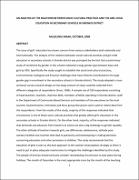| dc.description.abstract | The issue of girls’ education has drawn concern from various stakeholders both nationally and internationally. This analysis of the relations between social-cultural practices and girl-child education in secondary schools in Sironko district was prompted by the fact that a preliminary study of enrolment by gender in the schools indicated a large gender gap between boys and girls by 43%. Specifically the study sought to establish the social and cultural practices, environmental, biological and financial challenges that have hitherto contributed to the large gender gap in enrolment in the secondary schools in Sironko district. The study adopted a cross-sectional survey research design so that large amount of views could be collected from different categories of respondents (Enon, 1996). A sample size of 100 respondents consisting of head teachers, teachers, chairmen BOG, members of NGOs operating in Sironko district, staff in the Department of Community Based Services and members of the executives on the local councils. Questionnaires, interviews and focus group discussions were used to collect data from the respondents. From the results of the study, majority of the responses indicated that circumcision is one of those socio-cultural practices that greatly affect girls’ education in the secondary schools in Sironko district. On the other hand, majority, of the responses indicated that demands and advances from teachers at school are also a big challenge to gender equality. The other attitude of teachers towards girls, sex differences, adolescence, attitude poor sanitary facilities low incomes that lead to patriarchy and stereotyping in making decisions concerning education and other provisions to children. The study recommends that the education of girls is seen as the best approach to the women emancipation strategy so there is need to put in place adequate mechanisms to mitigate the challenges identified by this study. The people of Sironko should seriously consider rescheduling circumcision to take place during holidays. The month of December is the most appropriate since by this month all the teaching
2
and learning is non-operative. Sensitization of parents on issues of the girl-child education is
very necessary in this struggle. Women educationists and other female professionals should go
out to talk to parents and the girl-child in order to encourage them in their education. | en_US |

